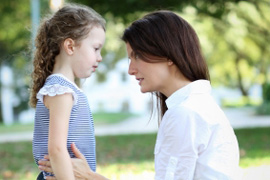Say You’re Sorry

“Say you’re sorry!” you demand of your angry five-year old who has intentionally pulled his sister’s hair. He stands in silence.
You demand an apology again. He manages an unapologetic “Soooory.”
“No, say it like you mean it,” you say.
He follows up with a more convincing apology, but not nearly as remorseful as you would have liked. You let it go.
What are the chances of your son feeling such remorse that he will not pull his sister’s hair again? What are the chances of his taking the initiative to say sorry the next time it happens? What are the chances of his going off to play having learnt a lesson? I’d say pretty slim to none. Saying “I’m sorry” as a result of having been told to do so, is merely an act of compliance. It does not teach empathy, remorse or encourage positive behaviour.
So, what’s the alternative?
Try this: lower your body so that you are eye to eye with your child and say something like “Pulling hair hurts.” Then, wrap your arms around the child whose hair has been pulled and comfort that child. Once you’ve comforted the ‘victim,’ turn to the ‘aggressor’ and say, “Did pulling your sister’s hair help you get what you needed?” By handling the situation in this fashion, you are allowing your child to see you displaying empathy towards the ‘victim’ and helping your child learn to explore different options.
You may also want to talk about a logical consequence if your child were to choose not to consider other options. You may say something like “I know that you are capable of choosing other options in the future, but if you don’t, then we need to consider what the consequences of your aggressive behaviour will be.”
Logical consequences (which must be relatable to the aggressive behaviour) may include: your child having to play alone for a period of time (following the incident) or of having to re-enact what happened prior to the hair pulling so that he can be helped to come up with different options for handling his frustration or anger.
This type of intervention may take a little longer than demanding and getting a hasty apology, but will likely result in better long-term behaviour and a more positive relationship between you and your child.












